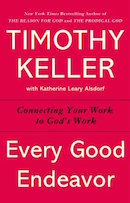Woven Into God’s Story of Darkness and Light, Part 2
Daily Reflection / Produced by The High Calling
For you were once darkness, but now you are light in the Lord. Live as children of light.
Ephesians 5:8
In yesterday's reflection, we saw how the imagery of darkness and light reflects Old Testament themes, beginning with creation and continuing through the prophet Isaiah. According to the prophet, those who walk in darkness will one day see the light as the Lord himself shines upon them. This theme is picked up in Ephesians 5:8. Yet, in this verse, we are not just in darkness or light. Rather, we are darkness and then "light in the Lord."
This remarkable use of darkness/light comes from Jesus himself. In the Gospel of John, Jesus fulfills the prophecy of Isaiah in being "the true light that gives light to everyone" (John 1:9). Jesus, as the light, "shines in the darkness, and the darkness has not overcome it" (John 1:5). Jesus identifies himself as the "light of the world." He says, "Whoever follows me will never walk in darkness, but will have the light of life" (John 8:12). Then, in a passage that prefigures Ephesians 5:8, Jesus says, "You are going to have the light just a little while longer. Walk while you have the light, before darkness overtakes you. Whoever walks in the dark does not know where they are going. Believe in the light while you have the light, so that you may become children of light" (John 12:35-36).
In the Gospel of Matthew, those who follow Jesus, the light of the world, are not just light-followers. We are more even than "children of light." According to Jesus, we also are "the light of the world" (Matt. 5:14). Thus, Jesus says, "Let your light shine before others, that they may see your good deeds and glorify your Father in heaven" (Matt. 5:16). Of course, it would be a mistake for us to see ourselves as the light of the world in exactly the same way Jesus is the light of the world. Yet, as we are in relationship with him, as we walk in his light, we become luminous reflectors of his divine light. We shine into the dark world through what we do and say, not in order to draw attention to ourselves, but so that those who live in darkness might "glorify [our] Father in heaven."
Similarly, Ephesians 5:8 uses the metaphor of darkness and light fluidly. Yes, we are to walk (the NIV uses "live" to translate the Greek verb that literally means "to walk") in the light and become children of light (as in John 12). But, as in Matthew 5, we are light now because of what God has done for us in Christ. Like Jesus, we have the privilege and calling of shining God's light, God's truth, into the darkness around us.
QUESTIONS FOR FURTHER REFLECTION: Take some moments to consider the stunning truth of Ephesians 5:8: You are light in the Lord. What does this mean to you? How does this make you feel? What does this inspire you to think or to do? How can you live as light in the world today?
PRAYER: Lord Jesus Christ, indeed, you are the light of the world, the servant of God who enlightens all nations. I praise you today as the unique incarnation of divine light.
Yes, if I take you at your word—and, indeed, I do—then I thank you also for making me to be the light of the world as well. Even to say this, Lord, sounds presumptuous . . . and overwhelming . . . and impossible. But I realize that I am not light in myself, but only in you. My light is real, but reflected. It is light that comes from you.
Help me, O Lord my light, to shine with your light today. Amen.
Social Justice at Work
When God asks us to take care of the orphan, widow, and the poor, what does that mean for our workplaces? How do we follow a social justice mandate in our offices, schools, warehouses and retail establishments? And how does it change our world when social justice works the way God intended?
In the series Social Justice at Work, The High Calling explores social justice in the places we work and the ways we work. Join us as we discuss how our calling to the "least of these" affects us outwardly in our jobs, and inwardly as we perform our jobs, via theme-related Bible reflections, featured articles, and discussion starters. We encourage you to add your questions, concerns and comments, engage with us on social media (especially Twitter and Facebook), and invite your friends and colleagues to do the same.






